Australian navy begins evacuation of beach where thousands had sought refuge from fire
Prime minister confronted, jeered by angry residents in wildfire-ravaged New South Wales
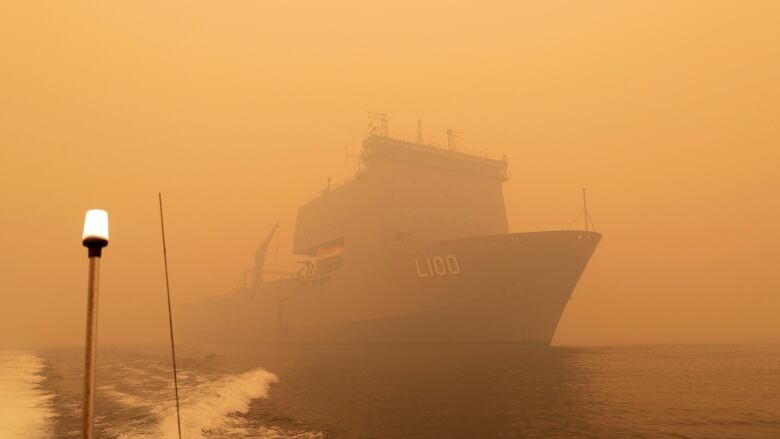
The Australian navy on Friday began the evacuations of some of the thousands of people stranded on the east coast of the fire-ravaged country as a searing weather front was set to whip up more blazes across the states of Victoria and New South Wales.
At the peak of the summer holiday period, tens of thousands of holidayers were urged to leave national parks and tourist areas on the New South Wales (NSW) south coast and eastern areas of Victoria before a return of temperatures above 40 Cand strong winds on Saturday that are expected to cause conditions to deteriorate.
Traffic out of Bateman's Bay, a popular holiday spot on the NSW south coast, was less busy than on Wednesday and Thursday, with many people having heeded the directives to leave the area before the weekend.
Victoria declared a state of disaster for the first time, giving authorities broad powers to compel people to leave their properties and take control of services, similar to the state of emergency that has been declared in NSW.
Andrew Crisp, emergency management commissioner for Victoria, urged people in at-risk areas to leave their homes immediately and not count on luck to avoid disaster.
"This is your opportunity to get out. It is not just the fires we know. It is the new fires that might start today," he told ABC News.
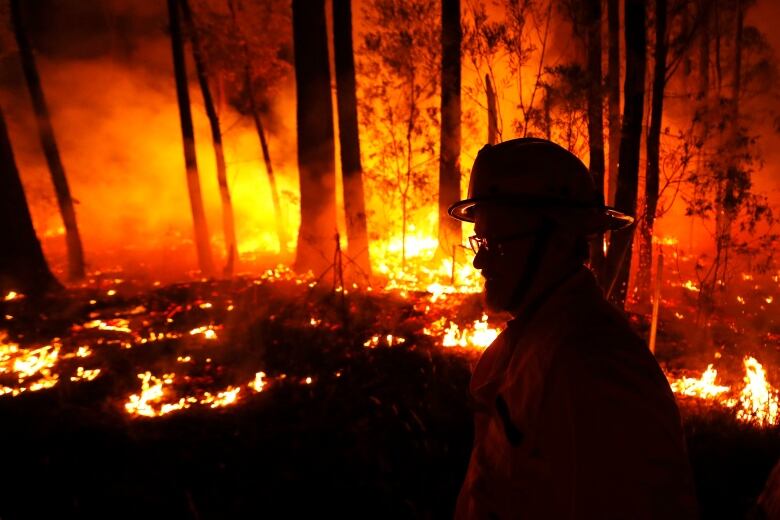
Another death from the fires in NSW was confirmed on Friday, taking the toll in the state this week to eight. Two people have died in Victoria's fires, and 28 others are unaccounted for.
On Friday morning local time, HMAS Choulesstarted the evacuations of nearly 1,000 of the 4,000 people stranded on thebeach in Mallacoota, a coastal townin far east Victoria, federal member of parliament Darren Chester tweeted. They have been stranded since Monday night.
With all roads blocked, sea transport is the only way out of the stricken town. Each round trip could take a day or more.HMAS Choules is expected to make two or three voyages over the coming days, state authorities previously said.
"It is hell on Earth. It is the worst anybody's ever seen," Michelle Roberts said by telephone from the Croajingolong Cafe she owns in Mallacoota.
Roberts hoped to get her 18-year-old daughter onto the naval ship, which arrived off the town on Thursday, in order to escape the fires and thick smoke engulfing the town.

The early and devastating start to Australia's summer wildfires has led authorities to rate this season the worst on record. About five million hectaresof land have burned, at least 17 people have been killed and more than 1,400 homes have been destroyed.
In addition to Victoria and NSW, fires have also been burning in Western Australia, South Australia and Tasmania.
Cooler weather since Tuesday hadaided firefighting and allowed people to replenish supplies. Vehicles formed long lines at gas stations and supermarkets on Thursday, and traffic was gridlocked as highways reopened.
The NSWRural Fire Service said Friday there are 127 fires burning in the state, and warned of a fire front stretching 60 to 70 kilometres on Saturday.
"There is every potential that the conditions on Saturday will be as bad or worse than we saw" on Tuesday, NSW Rural Fire Service Deputy Commissioner Rob Rogers said.
PMjeered, insulted by angry residents
On Thursday, Prime Minister Scott Morrison was confronted by angry residents, who cursed and insulted him as he visited wildfire-ravaged New South Wales. Locals in Cobargo yelled at him, made obscene gestures and called him an "idiot" and worse, criticizing him for the lack of equipment to deal with the fires in town.
Scott Morrison has hastily left a meeting with bushfire victims after angry residents began yelling furiously. #9News pic.twitter.com/q0iqmBp7to
—@9NewsAUSThey jeered as his motorcade drove off. In thetown of Quaama, a firefighter refused to shake hands with him.
"Every single time this area has a flood or a fire, we get nothing. If we were Sydney, if we were north coast, we would be flooded with donations with urgent emergency relief," a resident said in Cobargo.
Morrison, who has also been criticized over his climate change policies and accused of putting the economy ahead of the environment, insisted that Australia is "meeting the challenge better than most countries" and "exceeding the targets we set out."
"I'm not surprised people are feeling very raw at the moment. And that's why I came today, to be here, to see it for myself, to offer what comfort I could," Morrison said, adding, "There is still, you know, some very dangerous days ahead. And we understand that, and that's why we're going to do everything we can to ensure they have every support they will need."
Canadian tourist describes 300-kilometreordeal
Marie-ve Leclerc of Quebec Citywas visiting her brother in Bermagui, located on the east coast of New South Wales, when the fires started to encroach on the town. Leclerc told CBC Montreal she was woken up the morning of New Year's Eve by neighbours knocking at the door to tell them the fire was coming.
"It was still dark in the morning, dark as night," she said. "My brother and I went up the hill and we saw the fire. There was a light, and we could smell the smoke.
"We thought we might just have to go to the beach and swim to escape from the flames."
Leclerc's family took shelter at a local bowling alley, which had been turned into a makeshift shelter. She said communications were down, so even police and firefighters struggled to get in touch with the outside world.
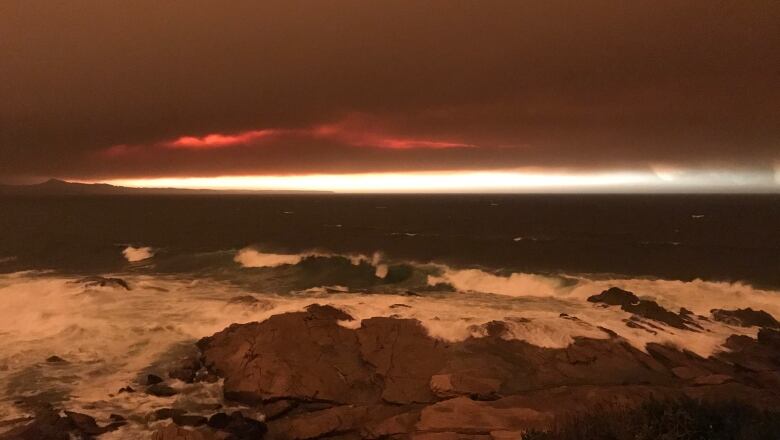
Finally, officials told them they had to leave. But the local gas station was out of fuel, after a truck that was expected to come to town didn't show. Leclerc didn't know if her car had enough gas to get them clear of the fire.
"I had to hitchhike to the next town," Leclerc said.
She got the gasoline and hitchhiked back, fuelled up the car and left. She drove for eight hours in bumper-to-bumper traffic to get to Canberra, the national capital located 300 kilometres northwest of Bermagui.
"It was completely dense smoke, fires, we knew there were fires on the road," she said. "They closed the roads behind us because more was coming."
"It's like an apocalypse happening."
She said they don't know what's going to happen to their home in Bermagui, but Leclerc said she's going to try to fly back to Canada.
3rd state of emergency in 2 months
New South Wales authorities on Thursday morning ordered tourists to leave a 250-kilometre zone along the picturesque south coast. State Transport Minister Andrew Constance said it is the "largest mass relocation of people out of the region that we've ever seen."
New South Wales Premier Gladys Berejiklian declared a seven-day state of emergency starting Friday, which grants the New South Wales Rural Fire Service commissioner more control and power.
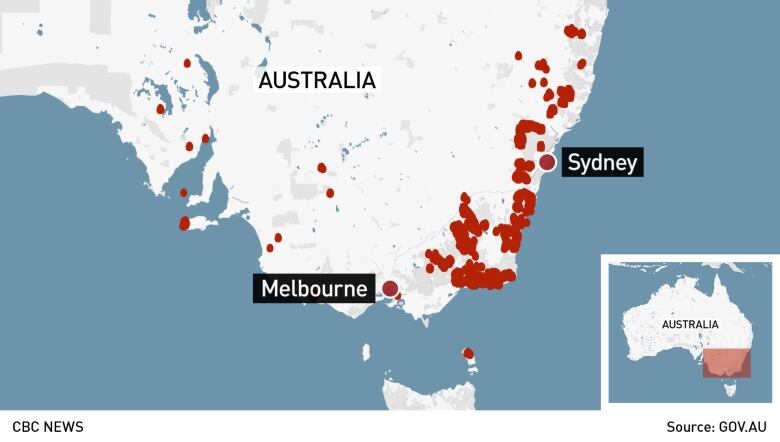
It's the third state of emergency for New South Wales in the past two months, after previously not being implemented since 2013.
"We don't take these decisions lightly but we also want to make sure we're taking every single precaution to be prepared for what could be a horrible day on Saturday," Berejiklian said.
A statewide total fire ban will be in place on Friday and Saturday.
A contingent of 39 firefighters from the United States and Canada landed in Melbourne on Thursday to help with the catastrophe.
Smoke from the wildfires made the air quality in Canberra the world's worst in a ranking index Thursday and was blowing into New Zealand.
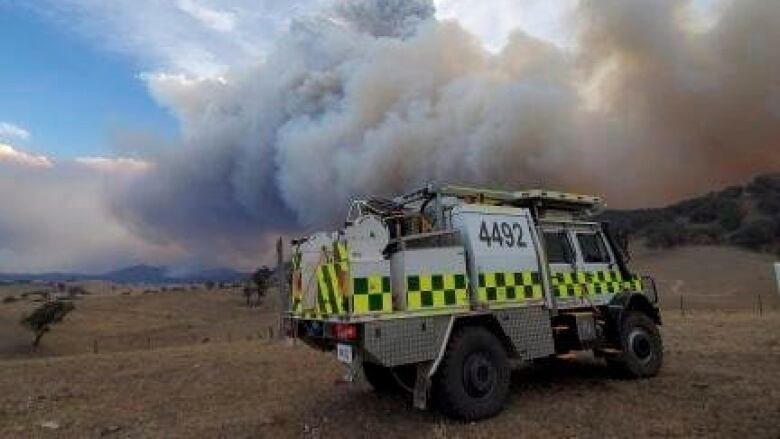
With files from Laura Marchand, Chloe Ranaldi and The Associated Press












_(720p).jpg)


 OFFICIAL HD MUSIC VIDEO.jpg)
.jpg)



























































































